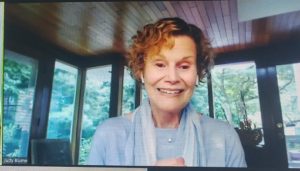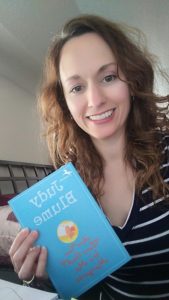Art | Books | Fiction Writing | Writing
Are You There Judy Blume? – 16 Takeaways from Listening to My Writing Hero

I have not worn makeup since mid-March, since this pandemic began. But I put on mascara and lipstick and curled my hair to see Judy Blume.
By “see” I mean through my computer screen for the Society of Children’s Book Writers and Illustrators Summer Spectacular happening now through August 4. This conference normally occurs in person in Los Angeles but thanks to a virus, it happened virtually, and I could afford to attend in the comfort of my home.
The reason I decided to attend was mainly my writing hero, Judy Blume, was listed as a speaker. I have read dozens of her books as a child, reread a few of them with my children and now I’m reading them again as an adult.
I never grow tired of her stories and of her words. Her characters always resonate. They are always both funny and slightly sad.
I still own a copy of Are You There God? It’s Me, Margaret. I kept it next to me as I heard her speak through Zoom less than an hour ago.

I took three and a half pages of notes while she spoke. I probably could have (should have?) taken more but I was trying to soak everything in.
She smiled almost the entire time she was speaking and even when she was not talking. Judy seems like that type of person you could sit and talk with for hours about all things in life. No topic would be taboo, just like in her books.
I cried a little when I first saw her and when her conversation ended. I knew I would. I was thankful it was not that ugly cry with mascara going down my face. But still, I was just in awe of her, even through my computer monitor.
Here are some of the things she said during her session that I never want to forget, that I want to share with others to inspire them, whether it’s in your own writing pursuits or other life goals:
- After you finish that project (writing or otherwise), sit down and start that next thing. Don’t wait for that rejection to come in. Start the next thing that will lead to success.
- Judy Blume said she has no sense of direction and gets lost easily. Thank you Judy. I feel like we are kindred spirits. One time I forgot where I parked and spent an hour trying to find my car again.
- Surround yourself with supportive people. Don’t hang around long with teachers or writing mentors who don’t encourage you.
- Write down the different aspects of your story in a notebook – have a section for characters, a section for place and a section for dialogue.
- Judy Blume uses a notebook because her mind is “cluttered and messy.” She said, “I have to work at dreaming it down and cutting it out, sticking to just what needs to be there.
- Judy said, “I’m a re-writer. I never share or send my first draft. Usually my third is the one I’ll let someone else look at. I used to do at least five drafts.”
- Go deep into your characters. Allow yourself to be surprised. As writers we don’t always know what is going to happen.
- Get rid of your inner-critic and your sensor while you’re writing. Put them away until you’re finished.
- Allow yourself to be free when you write. You should feel safe and be able to write anything you want.
- Be brave when you write. “I had a lot of fears as a child, but when I write I’m fearless,” Judy said.
- Be honest and authentic in your writing. You need to be on the side of your characters, especially children characters.
- Don’t follow any rules or put yourself in a box – Just write what you know is right and true for you at the time.
- Characters will take a life of their own. Remember that. Mine started off as people I knew or a story I had heard or something from my own kids’ lives or my childhood but then they go down their own paths and surprise even me.
- Always keep in mind the backstory. (Think back to playing with dolls or figurines as a child and how you may have given each one a story and character traits.) Use that or help it develop your writing.
- Don’t be afraid to tackle uncomfortable topics in writing. As long as you are OK with writing it, don’t worry about what others may feel or think about it.
- Sometimes less is more – don’t over-analyze your stories. Just write and allow yourself to be creative when you’re in that writing space. This way you won’t paralyze your efforts or your story.
Good advice Judy. Can I call you Judy? I feel like I could if we were sitting at a coffee shop or in your bookstore in Key West.
I love you. Not in a creepy stalker-ish way. But in a I think you are amazing person, writer, soul and human on this planet kind of way.
Thank you for your wonderful books and being one of the reasons I am a writer today.

William Robert DuPriest
Thank you for sharing that heartfelt tribute.